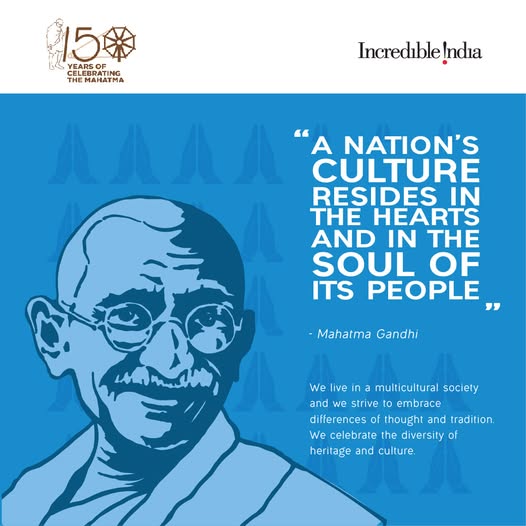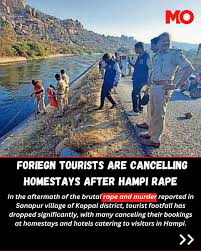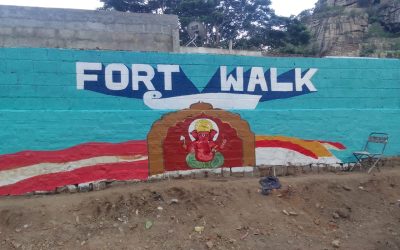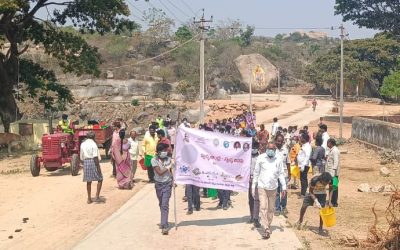
“The truest test of civilization, culture and dignity is character and not clothing.”
—Mahatma Gandhi
Definition of Culture: customary beliefs, social forms, and material traits of a racial, religious, or social group OR the set of shared attitudes, values, goals, and practices that characterise an institution or organization. (https://www.merriam-webster.com/dictionary/culture)
News- Gang Rape Rape in Hampi, March 6th, 2025: Three men gang raped one foreign tourist and her homestay owner, and killed their male friend who resisted. (https://www.thehindu.com/videos/hampi-rape-case-how-can-tourist-spots-be-made-safer/article69341582.ece)

Lessons for Fledging Tourism Industry of Kangundi Kuppam (Chittoor, Andhra Pradesh, India)
Relevance of Culture: Be it a village, a tourist destination or a corporate office, culture sub-consciously works to maintain discipline and loyalty to the social group/ organisation. Thus, it positively contributes to the peaceful development of the social group and the ethical success/ profitability of a company.
Role of Culture in Tourism: Tourists are attracted to the natural beauty of a place (Hampi, Goa, Lakshadweep, Srinagar, Hampi) or to the cultural beauty of a place (Hampi, Khajuraho, Jaipur, Varanasi). The ethos/ values of host residents of a tourist place affect tourists of both these categories of tourism. In-bound tourists however, also have the potential of spoiling the culture of the host village/ society due to the infiltration of evils associated with tourism e.g., abuse of illicit substances, materialism, etc. Lack of government regulations for tourism industry in the host village/ society magnify this, resulting in breakdown of social values and the rule of law. The above sad news from Hampi is an apt example. In homestay based tourism, local culture (ethos, values and behaviour) of host homestay owners, villagers and tourism service providers gains strategic important. The three reasons for this: Firstly, the guests are 24×7 vulnerable to the hosts (and vice versa); Secondly, increased opportunity for various local artisans and performers to earn from the sale of handicrafts, cuisine, etc and from the display of music, drama, couture, etc; Thirdly, the potential to help spread peace by our ancient message of ‘Vasudhaiva Kutumbakam’ (the World is One). Strong foundations of local culture and its display to tourists can help the hosts earn money, which in turn will help protect and promote their local culture. This will also help keep hosts and guests safe from each other, both physically and emotionally.
Climb in Culture: These three words in the logo of #KangundiBouldering are its tagline. #ClimbInCulture is not just a slogan or a hashtag. It qualifies the kind tourism being promoted in Kangundi i.e., #bouldering, #climbing, #slithering and #rockclimbing within the overall umbrella of local culture (values, customs, traditions, art, craft, music, dance, etc). The vision is clear; ‘Atithi Devo Bhava’ (guest is God) tourism to help create businesses and jobs and thus, protect and promote local culture for being passed on to the next generation with stronger roots. Thus #ClimbInCulture aims to make #BoulderingInKangundi a memorable experience for both the guest tourists and the host homestay owners, guides, etc of Kangundi. So let’s encourage #Go2Kangundi by a warm #AaoKangundi (come to Kangundi) invitation.
Conclusion: ‘Climb Kangundi’s Inselberg In Culture’ is in line with our National idea of ‘Swachh Bharat’ (Clean India) for increased tourist footfalls i.e., clean thoughts, clean financial dealings and a clean environment so that our tourism sector contributes to the making of #SuwarnaKuppam (Golden #Kuppam, vision of Kuppam Area Development Authority), #SuwarnaAndhra (Golden Andhra Pradesh, vision of Hon’ble Chief Minister to Andhra Pradesh) and #ViksitBharat.




